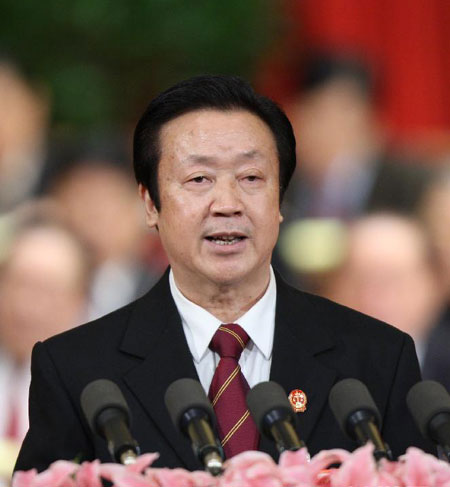
BEIJING - While admitting that some problems exist in China's judicial system, Chief Justice Wang Shengjun on Sunday vowed to push forward reform to realize judicial justice.
China needs to improve the work of courts and deepen the reform of its judicial system, Wang said in a report on the work of the Supreme People's Court (SPC) delivered at a meeting of the annual parliamentary session.
|
 Chief justice Wang Shengjun delivers a report on the work of the Supreme People's Court at a meeting of the annual parliamentary session on Sunday. [Photo/Xinhua] |
"Some courts have not done well in improving the transparency of court affairs and promoting the democratic judicial system," he said.
Some judges have behaved badly and exhibited a poor working style, as irregular practices in court proceedings and hearing delays could still be found, he said.
A small number of judges were even found taking bribes and perverting the law, he added.
This year the SPC will work to reform court procedures, speed up proceedings of civil cases involving small sums of money and improve rules for citizens to observe trials, he said.
Chinese courts will better accept and respond to supervision from lawmakers, political advisors and the public, he said.
He urged more efforts in accepting supervision from the general public, including soliciting opinions from the public, giving more heed to media reports and the voices of netizens and promptly responding to social concerns.
Last year, Chinese courts made persistent efforts in pushing forward judicial reform, Wang said.
The number of jurors, usually selected from the public, increased to 83,000 nationwide and they took part in the first trials of about 1.12 million cases, accounting for 46.5 percent of total cases, according to the report.
Jurors' wider participation in trials has contributed to judicial justice, Wang said.
The SPC promoted the trial run of speeding up proceedings of civil cases involving small sums of money last year -- an important effort in reforming court procedure, he said.
Courts at all levels worked hard to improve transparency, including publishing judicial documents online and building a system for citizens to follow court proceedings.
Efforts were also made to settle people's complaints about judical work. More than 90 percent of local courts have set up departments to take in people's complaint letters or handle visits concerning filing charges.
"We consider complaint letters and visits to be important channels for learning the opinions of parties in lawsuits and resolving problems," Wang said. "The supreme court urged courts at all levels to handle them well."
More than 790,000 letters and visits were received last year, down 25.9 percent from 2010, according to the report.